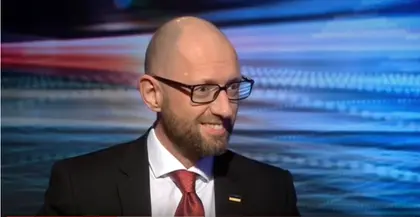While the media business continues to struggle financially, with most if not all outlets unprofitable, Ukrainian politicians have shown how to get rich in the industry.
On New Year’s Eve, ex-Prime Minister Arseniy Yatsenyuk, and Inna Avakova, wife of Ukraine’s Interior Minister Arsen Avakov, sold their shares in Espresso TV channel to Atmosphere Entertainment Inc., a firm registered in New York and owned by Ivan Zhevago, son of Ukrainian oligarch and lawmaker Kostyantyn Zhevago.
The channel started broadcasting during the EuroMaidan Revolution in 2013, transmitting live coverage of the mass public protests in Kyiv that toppled President Viktor Yanukovych after 100 days on Feb. 22, 2014.
Yatsenyuk owned 30 percent of the channel’s shares while Avakova had 40 percent.
Lawmaker Sergii Leshchenko said he had asked National Anti-Corruption Bureau of Ukraine to investigate the deal because it raises red flags on money laundering.
Leshchenko said at Channel 24 that in June Yatsenyuk bought his share for a “ridiculous, even for a small channel price” of Hr 3.8 million (or $145,000.) In six months he sold it to Zhevago for $1.5 million, making a profit of nearly 1,000 percent.
“So it was 10 times more profit from money spent just six months ago,” Leshchenko said.
Espresso TV co-founder and lawmaker from Yatsenyuk’s People’s Front Party Mykola Kniazhytskiy said he’s not afraid of any investigation. He said Yatsenyuk bought his share at a rate set in 2013 when Espresso TV was just in the making.
“We agreed that they (Yatsenyuk and Avakov) may buy their shares at this price,” Kniazhytskiy told the Kyiv Post.
Kniazhytsky’s wife Larysa, another co-founder of the TV channel, owns 22.5 percent of Espresso TV while Kniazhytsky is a member the channel’s editorial board.
Olga Lappo, Yatsenyuk’s spokesperson, said that Yatsenyuk sold his Espresso TV shares “through a transparent procedure” and will now pay Hr 7 million ($249,000) in taxes to the state budget.”
She told the Kyiv Post that Leshchenko and some other individuals use “any fabrications to discredit Arseniy Yatsenyuk and his political force.”
“One of the reasons for selling the channel’s share for Yatsenyuk was to avoid speculation on the politicization of the activity of this media,” Lappo said.
Avakova sold her stake for $1.95 million, according to her husband’s Twitter post. She will pay Hr 9.7 million ($320,000) in taxes.
However, experts say that the case raises suspicions.
“When you buy some share for one hryvnia and made nine out of it, it is called corruption everywhere in the world,” said Oleksa Shalaysky, head of Nashi Hroshi anti-corruption project.
Prosecutions of money laundering
Olena Shcherban, chief lawyer of the Anti-Corruption Action Center watchdog, said that the Espresso deal shows signs of money laundering.
It might be of interest not only for the National Anti-Corruption Bureau but also for the State Financial Monitoring Service – a state agency entitled for detecting the cases of money laundering and reporting to the law enforcement bodies about them.
“But State Financial Monitoring is headed by (Ihor) Cherkasky, who is believed to be a protégé of the People’s Front,” Shcherban said.
The lawyer added that investigators will also have to prove that the money used for the deal had the illegal origin, which is not easy to do, especially when a foreign company was involved in a deal.
A person found guilty in money laundering may end up in prison with the assets confiscated, according to Ukraine’s laws.
But Shcherban couldn’t recall any cases in Ukraine when the real owners not the companies’ front men have been sentenced for this.
Successful deals, wins and royalties
Ukraine’s politicians have invented many ways to explain their lavish lifestyle.
Leshchenko compared Yatsenyuk’s case with the schemes of the Yanukovych, who declared $2 million in royalties for four books that few people read or could even find.
The wife of Lviv Mayor Andriy Sadovy, who is also a leader of Samopomich Party, sold 3 percent of her share of Lux Lviv-based TV and radio company for the suspiciously high price of Hr 3 million in 2012. In the next year, Sadovy and wife showed off their new spacious house they had bought in Lviv.
Oleh Lyashko, the leader of the Radical Party, reported in October that he had won three times over the year at the national lottery, gaining this way almost $22,000.
Prime Minister Volodymyr Groysman twice sold real estate to his wife over the last two years, according to a state registry that reveals property and income declarations of civil servants.
In late December, he made a deal worth $350,000 with Magigrand Ltd. – 80 percent of which is owned by Olena Groysman.
You can also highlight the text and press Ctrl + Enter




